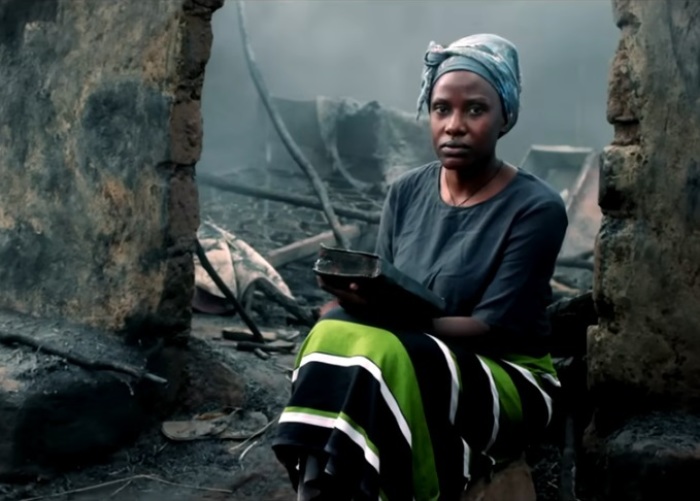Christian woman testifies of God’s faithfulness after husband, son martyred in Nigeria

A new short feature film from a global missions organization serving persecuted Christians shares the inspiring story of courageous faith faced by a Christian woman in northern Nigeria.
Voice of the Martyrs (VOM) released Rebecca: Nigeria, the true story of a Nigerian Christian woman who watched helplessly with her daughter as Boko Haram militants killed her husband and son and burned their home.
"There was nothing we could do to defend ourselves," she said. "I was devastated. I mourned for many months."
After the attack, Rebecca searched the charred remains of their home and recovered the Bible she and her husband received as a gift from church on their wedding day. She said she and her husband read that Bible together every day.
"I still use this Bible," Rebecca said. "It reminds me of God's faithfulness."
"The Lord is a husband to all widows," she added. "I look to Him for every need. This is what I am still holding onto."
The feature was released to coincide with the International Day of Prayer for Persecuted Christians (IDOP) on Monday, a global prayer movement for Christians worldwide who boldly proclaim their faith, regardless of the cost.
Todd Nettleton, chief of media relations and message integration for VOM–USA and host of VOM Radio, told The Christian Post he hopes the film personalizes the struggle so many Christians face around the world.
"Every year for IDOP, we do a short film for churches to use, for families to use to kind of put a face on persecuted Christians, to put a face on the people that we're praying for," Nettleton said.
Nigeria is designated as a "hostile" nation in the 2022 VOM Prayer Guide, a designation for countries or large areas of nations where governments may attempt to protect the Christian population but Christians are still persecuted.
For Nettleton, Rebecca's story is essential for the world to hear, and "it also illustrates the importance of God's word for our persecuted brothers and sisters."
In addition to Nigeria, Nettleton said there are other global hotspots where Christians face increased persecution, including China and Iran, which has faced growing turmoil in recent weeks following the death of Mahsa Amini. The 22-year-old was arrested for not wearing the mandatory dress code and died in police custody.
Nettleton said since Amini's death, the Gospel is going forth as a sort of counter-culture messaging in response to the growing discontent with the Islamic Republic among many Iranians.
"There are Christians out among the protesters, not necessarily to protest but to be a witness for Christ, and to say, 'Hey, we understand your frustration with the government, we understand your frustration with Islam, let me tell you about Jesus'," said Nettleton.
Nettleton hopes "this year's IDOP resources from VOM will drive hundreds of thousands of Christians around the world to pray for our family in Nigeria" and "our spiritual family members in other restricted and hostile nations."
When asked to share a story about the practical impact of a global effort, such as IDOP, Nettleton shared the story of Petr Jasek, who traveled to Sudan in 2015 on behalf of VOM to meet with pastors and help persecuted Christians.
Jasek was arrested and later charged with conspiring against the Sudanese government. He spent 14 months in a prison in Sudan, part of that time sharing a cell with Islamic State fighters.
"His life was in danger," Nettleton said. "And yet, every night at 9 o'clock … the lights go out, and Peter would go right off to sleep, no matter what was going on around him, no matter what danger he was in. … The lights go out, and Peter goes right off into a restful sleep."
After serving his sentence, Jasek returned home to the Czech Republic and learned that his church congregation had faithfully prayed for him every night at 8 p.m.
When it is 8 p.m. in Prague, it is 9 p.m. in Sudan — the exact time the lights were going out and Jasek went off into a restful sleep.
"He immediately knew that it was their prayers that had been the cause of his ability to go to sleep so quickly and his ability to rest so well, even in prison, even when he was in danger," said Nettleton.
"So when people ask me, 'Does it matter if we pray? Does it make any difference if we pray?' I always think of Peter going to that prison in Sudan and the prayers of his own church congregation that were allowing him to do that."





























